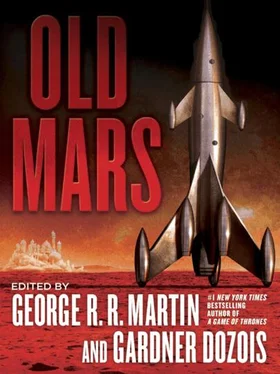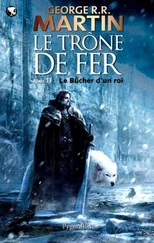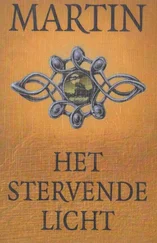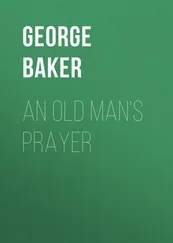Stone jerked his thumb at the roof. “All the old canals have dried up. There’s nothing left of them apart from traces of their beds. And no records, of course. Pretty much everything was lost during the great “four-millennia cannonade,” when asteroids and meteors pounded Mars to dust, down to most of her farthest shelters. There are a few freak survivals. Nothing much. The canals were deep and wide once, designed to get the most from dwindling water supplies. The meteors leveled them. But this Ia canal? It was underground?”
“My clan’s ancestors planned to build this great underground canal, protected from all foreseeable danger, completely encircling the planet, with branches serving other local systems. The canal was named for an ancient water goddess, Ia. Ia would connect to a series of hubs serving other canal systems. Its creators thought that it would, through the trade it would stimulate, bring peace to the entire planet. Ia would circle Mars from pole to pole, where the melting ice caps would continuously refill it. The project was abandoned long before my time.”
“Abandoned? What happened?” In spite of his circumstances, Stone found the story engaging. “It sounds a great idea.”
“During construction at the Pataphal cross-waterway intersection, after hundreds of miles of the Ia system had already been built, a terrible disaster struck. A whole section of the great Nokedu Cavern floor, which had been tested and found solid, fell away. Hundreds were killed. More of the cavern kept falling, until it formed a massive chasm, miles deep and far too wide to bridge. Black, unfathomable, the Nokedu Falls dropped deep into the planet’s heart. The entire project was abandoned. It was considered folly to attempt another sub-Martian watercourse. No more would have been said had not an extraordinary phenomenon occurred maybe a month after the project was closed for good. A guard reported seeing the canal slowly filling with water!
“Some freak of natural condensation created a system that had the effect of filling the Ia canal with enough water to float a good-size barge. But of course, at Nokedu the water again rushed into the great chasm. Damming didn’t work. It became pretty clear that the water had to circulate. Several expeditions had been made into the Nokedu Deep to find the cause of the phenomenon. The expeditions were lost or returned without success. The water supply remained continuous. Then, about five hundred years in your past, a quake dislodged the bomb.”
Mac played dumb. “What—and sent it down the falls where it could explode harmlessly?”
“You don’t seem to understand. The Sheev originally planned war against nearby planets, especially Terra. The bomb was too powerful. It was never meant to be detonated on Mars . Even in space, it had limited useful targets. It was a star bomb , intended to be launched at another planet and turn that world to cosmic dust!”
“And that’s what’s down there somewhere now?” Stone jerked his thumb toward his feet. “Ticking away as we speak. When’s it due to go off?”
“In just under seven hours,” said Krane.
“Great! So you simply made your problem our problem?” Mac didn’t try to disguise his disgust. Fear began to tie his insides together.
“Not deliberately. We only recently learned that Mars was still populated—or repopulated. This wasn’t the first time we’ve tried to contact someone like you or to defuse it. This was the closest we could get to you on this time-line.”
“If you know the future, you know what will happen.”
“This is the farthest we can get in time. We get nothing back if we go farther …”
Mac was silent, thinking that over. He was familiar with Gridley’s theories of radiant time. “So there might not be any future for us?”
The image shimmered as Krane picked up some kind of yellow gossamer scroll on which symbols sparkled. “Our best minds have worked on the problem ever since we knew about it. We have at last determined how to neutralize the n-bomb.”
Mac still didn’t speak. He just wanted to hear Krane’s pitch.
“OK. So where do I come into it?”
“We need you to do the neutralizing.”
“For what?”
“To save your planet. Research says you’re a Martian, even more than I am. You’re a survivor.”
“Except that there are easier ways to live.”
“That’s why you’ll get the sapphires.”
“A bag of indigo flame sapphires?”
“What the lep tried to show you. What Delph heard about.”
Mac grinned. “It’s a sweet incentive. If you’re right, I haven’t a chance of getting out of this alive. I might as well take the lot of you—or them—with me. You’re all as crooked as I am.”
“Except that’s not your style, Stone. You’re a Martian. You were born on Mars. You don’t want Mars to die like that. Not blown to bits.”
“OK. Let’s assume you’re right. How would I get down to this canal and do what I need to do to the bomb?”
“It’s not quite so simple,” said Krane. “The bomb moved, as I told you. After the ’quake it actually floated down the canal. Until it hit white water. Happily the casing is very strong and relatively light. By luck, it eventually caught between some rocks above the falls. Water currents coming in from three sides actually held the thing steady. It’s still there.”
“Rapids? That’s why your robot can’t reach it?”
“One reason.”
“Is it hard to dislodge?”
“That, unfortunately, isn’t a problem. It should dislodge relatively easily.”
“So? Where exactly is it?”
“It’s pretty much on the brink of that chasm,” said Krane. “Where the water of the Ia rushes over the broken canal floor and gushes down into we don’t know what. Into the heart of the planet.”
“On the brink of hell, in other words.”
“Pretty much,” said Krane. “But you’ll have help. Look over to your left. At the noman’s feet.”
Stone saw a large steel-and-slate chest, about a meter square. It had some odd markings stenciled on the side.
“Look inside,” said Krane. So Stone bent and lifted the catches, opening the lid, which eased up on its own. Inside was soft kalebite packing used for delicate scientific instruments. He picked this off carefully. The contents looked unexpectedly sturdy. He reached in both hands and took it out.
“It looks like a big helmet. Like one those old Terran firefighters had.”
Krane said, “It’s a Gollowatt’n battle hat. They once fought the Kolvini through the Martian catacombs and never once saw the light of day.” Quickly, he described the helmet’s intuitive features. “Modified for your use. It’ll let you see in the dark for a start. Heat pictures. And there’s a sensor that tunes to your own eyes so you can use them as supersensitive binoculars. There are extrapowerful lights for when you need to do fine work, such as on the bomb itself. There’s a set of force-tools you can project and use. But it’s a lot more than that. There are a million neurolinks so the helmet works intuitively according to the wearer’s normal responses. We built a detector into it, too, if it survived the journey.”
“Force-tools?”
“They’re modified and mostly intuitive, tuned to your brain so you only have to visualize the problem, not the tool itself. Best make appropriate head movements.”
“OK.” Stone was dubious. “So what’s the magic word?”
“There is none. The helmet was made for a Gollowat’n medic, believe it or not. That’s why it was built with an empathy conceptor, so the medic could work on a wounded soldier or an injured civilian at the scene, usually in a battle situation. Empathy was a Gollowat’n middle name. The greatest doctors on seven worlds. They’re porcine, of course, but close enough to humans for the helmet to work pretty well. It should be compatible with your suit. The noman will make any adjustments you need.”
Читать дальше












